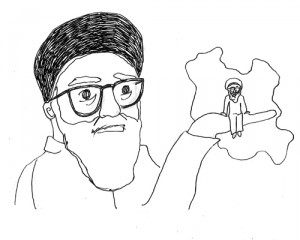New Iranian president won’t herald change
Hassan Rouhani, the president-elect of Iran, has been hailed internationally as the moderate Iran needs to repair its relationship with the West, fix the failing Iranian economy and curb the political power of the clerical elites within the Persian nation.
They’re wrong.
Rouhani, after his inauguration in August, will inherit a theocracy headed toward amassing nuclear capabilities. And unfortunately for Rouhani, there will be little he can do to stop this progression, because he does not actually wield much power in the government.
Michael Rubin, a resident scholar at the American Enterprise Institute, put it best when he told the National Review that the president of Iran “has about as much sway … as a secretary of agriculture has over the Joint Chiefs of Staff.” And, last I checked, Tom Vilsack (that’s the U.S. Secretary of Agriculture) isn’t a household name.
Supreme Leader Ayatollah Ali Khamenei, who wields absolute power in the state, leads Iran. His decisions cannot be overturned by judicial or legislative review, even though those bodies do exist within Iran. Essentially, the supreme leader is unchecked in his ability to wield the power of the Iranian state. Thus, Rouhani will have about as much influence over Iranian programs as Vilsack does currently.
Therefore, on issues of Iran’s nuclear program, Rouhani will not be able to reform anything. Khamenei has stated time and again, according to the Anti-Defamation League, that Israel is a stain that must be wiped off the map, preferably with a nuclear weapon. With Khamenei’s level of vitriol and huge stockpiles of enriched uranium, according to this week’s issue of The Economist, Iran can develop a nuclear weapon at any time. Technically speaking, Iran has “breakout capability,” or the ability to rapidly enrich enough uranium to make a nuclear weapon.
This nuclear capability has not gone unopposed. Indeed, the West, led by the United States, has levied enormous sanctions on Iran. These sanctions, while not compelling the Iranian leaders to halt the program, have only hurt the populace, contributing to massive inflation and general economic malaise. On this problem as well, it is unlikely that Rouhani will be able to effect change. The U.S. and the West will only lower the sanctions against Iran if Iran gives up the nuclear program. Because Khamenei holds the keys to the nuclear program, he effectively holds the keys to the sanctions, and thus the economy as well.
Even if Rouhani had the ability to truly lead Iran, there is little evidence that he would move away from the extreme position currently endorsed by the Ayatollah. Rouhani might be branded a “moderate” by the media, but he is no moderate in the Western sense. Calling Rouhani a moderate, as Rubin notes, is like saying Attila the Hun is a moderate, when compared to Genghis Khan. The fact remains that Iran’s Guardian Council, which approves all candidates for the Presidential election, disqualified 98 percent of all candidates before the election. There is no way the Council will let through any actual moderates or anything close to resembling a liberal reformer.
Finally, there are significant roadblocks standing in the way of Rouhani and bringing actual change to Iran. In May 2011, international media outlets such as The New York Times reported that President Mahmoud Ahmadinejad had fallen into ill will with Khamenei after trying to move the country in a new direction. The Times was quick to point out that previous presidents who had clashed with the Ayatollah had seen their power undermined at every opportunity, and a gradual but severe fade from political relevancy and public life after they stepped down from the presidency. In time, Ahmadinejad fell back in line with the clerics in Tehran, and Iran has stayed on the same course toward nuclear armament and extremism since.
Should Rouhani attempt anything similar, the Ayatollah can also threaten to not back the new president in the elections four years from now. If the Ayatollah seriously backs another candidate, it is unlikely that Rouhani will be re-elected. Of course, the Guardian Council and the Ayatollah could prohibit this president from running again in the national elections, nipping any hopes for re-election in the bud.
The elections have shifted the focus away from the true sources of power within Iran. Without new clerical leadership, Iran will continue to head toward nuclear capability and an inevitable clash with the West.
Dan Morgan-Russell is a sophomore majoring in international relations.

